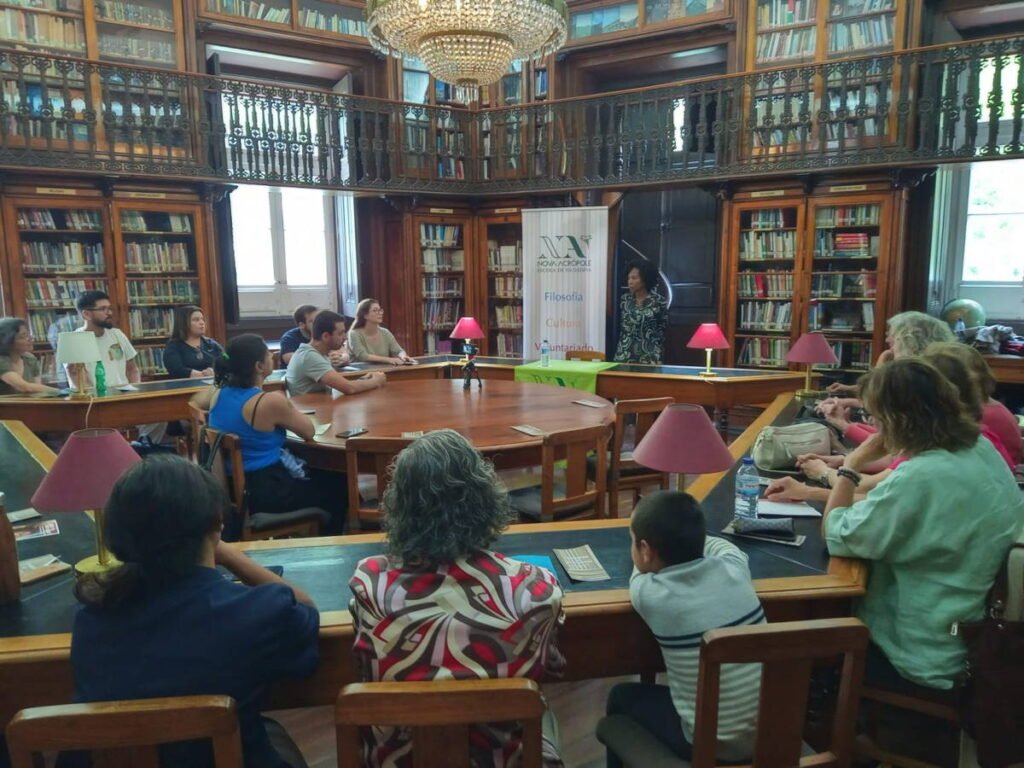
The School of Philosophy of New Acropolis is inspired by the powerful Platonic tradition to promote philosophy as a model of life that is based on knowledge and development of the qualities of each human being.
This school develops a common curriculum for all countries, taught in successive levels. It is an updated version of traditional Eastern and Western knowledge that, in accordance with classical humanism, connects science, arts, and philosophy, providing practical solutions for human beings to effectively channel their potential.
This active philosophy develops the ability to govern oneself, pacify the spirit, and act according to what our reason and conscience can grasp of the harmony of the world. It reconciles feeling, thought, and action. It teaches one to think for oneself and decide freely.
The program begins with an introductory course that can later be continued with a program developed in successive levels and subjects.
Introductory Course in Comparative Philosophy of East and West
New Acropolis offers its program of Introduction to Philosophy through courses aimed at disseminating knowledge about the major schools of philosophy. With its emphasis on the practical application of those teachings, it aims to introduce a new approach, which integrates Eastern and Western thought and all the civilizations of the world and promotes a social commitment to our own times. This programme teaches values of an universal ethics which can unify all human beings with no distinction of religion or culture.
Advanced courses
After the introductory course, the curriculum is divided into successive levels and subjects, responding to the educational proposal of the founding principles of New Acropolis. These principles advocate the comparative study of philosophies, sciences, arts, and religions as the path to comprehensive knowledge and a global vision that places human beings in contact with themselves and the universe, helping them discover and develop their immense potential, while leading them to greater knowledge and integration into the laws of life and the nature of which we are a part.
These levels are taught in stages at different locations around the world. Their pace, with two hours per week, makes them compatible with other studies or work occupations.
Psychology
Knowledge and practices which allow the expansion of consciousness, working on imagination and memory to develop our mind and learn to control emotions with higher feelings. It is the key to “know thy self” to reach a psychosynthesis.
What is Consciousness? Levels and states of consciousness. Factors that nullify and factors that favor its development.
Attention and its degrees. Exercises for developing and expanding attention. Concentration.
Memory. Its functions and types. Techniques and exercises for developing memory.
Intelligence. Discernment and reason. Steps to achieving intelligence.
Imagination. The power of mental images. The imaginary as the setting for our reality. Controlling fantasy. Exercises for developing and controlling the imagination. Visualizations.
Habits. Passive, conservative, and active habits. The danger of unconsciousness and emotional and mental habits.
Sensations. Different kinds of sensations. Control over sensations.
Affective phenomena. Emotions, passions, and feelings. The higher nature of love.
Control of negative emotions and developing emotional intelligence.
Personality. Factors in the development of one’s personality. Temperament and character. Personality Types.
Willpower. Aspects of the will in its relationship to the higher elements of the human being. Practices to strengthen the will.
Wisdom from East and West (two levels)
Compendium of subjects revolving around the universe, life and the human being, approached from the traditions of wisdom in East and West, and their implications for the postulates of current science.
The question of God in philosophical traditions.
Genesis and order in the Universe. Traditions on the creation of the Cosmos.
The Human Being. Eastern and Western approaches to the inner nature of the human being. Planes of consciousness and energy centers.
Anthropogenesis: origin and evolution of the human being. Current scientific vision and mythical traditions. Theory of submerged continents.
Fundamental principles of the Hindu worldview: Fundamental laws of life: Dharma, Karma, Reincarnation.
Philosophy and religions. Contributions of great spiritual masters of humanity: Vyasa, Hermes Trismegistus, Zoroaster, Orpheus. Siddhartha Gautama, Buddha, Jesus Christ, Muhammad.
Historical tradition of societies of philosophical and esoteric studies in the West: Neoplatonism; the Eclectic Society of Alexandria; Giordano Bruno; Rosicrucianism; Freemasonry; Theosophical Society.
The so-called lost sciences: Arithmetic and sacred geometry. Numbers and the genesis of forms. Astrology and astronomy. Alchemy, the science of mutations. Matter, energy, and spirit. The four elements in the constitution of life.
Symbolism of Civilizations
Comparative study and analysis of the myths and symbols of religions and civilizations throughout history.
The value of symbols and myths.
Sacred and profane languages. Myths and archetypes. The symbol as the language of the invisible. The symbol as knowledge.
Symbolism in religions and mythical traditions.
Gods and symbols of ancient Egypt.
Zoomorphism. Symbols, rites, and myths in Black Africa.
Symbolism in Sumer, Babylon, Phoenicia, Iran, and Hittites.
Far East: India, China, and Japan.
Theogonies, myths, and symbols in Greece. Symbols and gods in Rome.
Symbolism in the Americas. Mesoamerica. South America.
Symbolism in Europe: Scandinavians, Germans, Celts, Iberians, and other peoples.
Christian and medieval theological symbolism.
Symbolism in nature and art.
The Four Elements: Gods of Fire, Air, Water, and Earth. Symbols and representations. Mineral, plant, and animal symbolism. Symbolism of celestial bodies and constellations. Architecture as a symbol: from dolmens to cathedrals. Man as a symbol of the Infinite.
Applied Philosophy and Ethics
An overview of the major schools of moral philosophy of East and West.
Buddhic Philosophy and Buddhist Philosophy
Teachings of the Dhammapada: Concept of mind and the value of feelings in Buddhism. Commentaries on the Bhagavad Gita and the Uttara Gita: Analysis of their teachings. The Voice of the Silence (an ancient Tibetan text).
The Greek Phenomenon
Pythagoras and Pythagorean Morality. Socrates and his Moral Doctrine. The Moral Schools: Cynics and Cyrenaics. Antisthenes and Aristippus. Epicureanism: Epicurus and his doctrine. Skepticism: Pyrrho.
Stoicism
Stoic Doctrine and its practical application. Epictetus, Seneca, and Marcus Aurelius.
Neoplatonism
Morality in Plotinus. Excerpt from his Enneads.
America
Moral Transcendence in Ancient American Civilizations. Morality among the Aztecs, the Mayans and the Incas.
Sociopolitics
A philosophical approach to improving our society.
The Myth of the Cave and the concept of the Platonic Individual.
The civilizational pyramid: science, art, politics, and religion, and the universal archetypes: truth, beauty, justice, and goodness.
The Sphinx as a symbol of the evolution of humanity.
Education as a function of government. Essential aspects.
Individual ethics as the basis of social justice.
Public Speaking (two levels)
Development of beautiful and correct spoken expression.
History of Classical Public Speaking.
Expression techniques. – Voice and gesture regulation. Unblocking and habits.
What speaks within us. – Theory of Hieros Logos.
Practices and exercises in philosophical, historical, political, and pedagogical exposition. Debates and dialogues.
History of Philosophy (four levels)
An in-depth study of philosophical theories throughout history, analyzing their context and influence.
Module I. History of Ancient Philosophy in the West
Pre-Socratic philosophers. Natural philosophers. Orphism and Pythagoreanism. Socrates: Main concepts of his thought. Plato’s philosophy. Knowledge, goodness, and virtue in Aristotle. Epicureans, skeptics, and eclectics. Stoicism and the art of living. Marcus Aurelius, Seneca, and Epictetus. Plotinus and the School of Alexandria. Hypatia.
Module II. History of Medieval Philosophy
Christian Philosophy. Patristics and Gnosis. Clement. Origen and Basil. Saint Augustine. God and the soul. Creation and time.
Scholasticism. The School of Chartres.
Medieval Mysticism: Cathars and Albigenses. Bernard of Clairvaux.
Muslim Philosophy. Al-Kinder. Alfarabi. Avicenna. Al-Ghazel. Avempace. Abentofail. Averroes.
Hebrew Philosophy. Kabbalah. Isaac Israelite. Saadia. Ibn Gabirol. Maimonides.
Saint Bonaventure. Saint Albert the Great. Saint Thomas Aquinas.
Ramon Llull.
The 13th Century and the Philosophy of Nature. Roger Bacon. John Duns Scotus. William of Ockham.
German Mysticism. Meister Eckhart.
Module III. History of Eastern and Asian Minor Philosophy
Philosophy in the East and its Differences with the West.
Vedic Philosophy.
Buddhism: The Three Vehicles: Hinayana, Mahayana, and Vajrayana.
Chinese and Japanese Buddhism. Tibetan Buddhism. Tantrism.
China: Archaic China: Its classic texts of knowledge. Central ideas: Harmony of Nature and Law as a reflection.
Confucius and his works. Ethics and politics. The perfect man: the Sage.
Lao-tzu. The Tao. Taoism, Chuang-tzu. Magic and morality.
Japan: The “Shinto” books. Forces of nature. Ritual force. Forces of purity. Zen.
Asia Minor: Zoroaster. The Parsis. Sumerians and Semites.
Egypt: Hermetic philosophy. Science and magical thought.
Module IV. History of modern and contemporary philosophy.
Renaissance and humanism. Thomas More, Pico della Mirandola, Ficino, Campanella, Girdano Bruno…
Empiricism, rationalism, and the Enlightenment. From Bacon to Voltaire.
Kant, Höderlin, Hegel, Schopenhauer, Kierkegaard.
Marx, Engels. Nietzsche.
Bergson. Unamuno. Ortega y Gasset.
B. Russell. Husserl. Heidegger. Jaspers. Sartre.
A Vision of Postmodernism.Módulo III. Historia de la filosofía oriental y de Asia menor
History of Religions
A comparative study of the theological messages of the religions which, in all ages, have raised the consciousness of humanity.
Anthropology of Religions.
Indian Area: Brahmanism, Buddhism, Tibetanism, or Lamaism.
Sinic Area: Religion in early China. Confucianism. Taoism. Shinto Religion.
Egyptian Area: Religion in ancient Egypt.
Semitic Area: Sumerian, Hurrian, and Hittite religions. Persian religion. Zoroastrianism. Hebrew religion. Kabbalah. Early Christianity. Islamic religion.
Hellenistic Area: Religion in Crete and Maecenas. Greek religion. Roman and Etruscan religions. Christianity from the 3rd century onward.
Celtic Area: Gallo-Roman religion. Celts in Britain and Ireland.
Germanic Area: Germanic religions. Vikings. Norse epics.
Slavic Area: Preachers, Lithuanians, and Latvians. Ugrians and Finns.
Arctic Area: Eskimo religions. Siberian religions. s.
Africa and Oceania Area: Religions in Polynesia and Australia. Primitive religion on Easter Island.
American Area: North America: Nomadic and Indigenous peoples. Mayan and Aztec religions. Incan religion.
Anthropogenesis
Study of the conceptions on the human being and its evolution.
Cosmogenesis
Study of the conceptions on the origin of the universe and its development.
Astrology
Study of the conception of the universe as a system of interacting living beings.
Philosophy of Science
Study of the philosophical basis of all science and its epistemology which is below each scientific method.
Metaphysical Aesthetics
Study of the processes of the path to beauty throughout various civilizations and artistic eras.
Scope and depth of different art forms: Music, Painting, Architecture, Sculpture, etc.
Diplomas and Degrees

New Acropolis, as a private educational institution officially recognized in Brussels, has followed the Bologna System of European universities in creating its Academic Degrees.
Following the model of our own teachings, and given our broad curriculum, we have structured our Academic Degrees into: Expert, Specialist, and two Master’s Degree levels.
Degrees awarded by the School of Philosophy
“Diploma of Specialization in the Comparative Study of Universal Thought.”
“Expert Degree in Eastern and Western Philosophy” for 750-hour programs, equivalent to 30 credits.
“Specialist Degree in Eastern and Western Philosophy” for 750-hour programs, equivalent to 30 credits.
“Master’s Degree in Eastern and Western Philosophy.” Level 1 and Level 2. For programs with a minimum of 1,500 hours, equivalent to 60 credits each.

